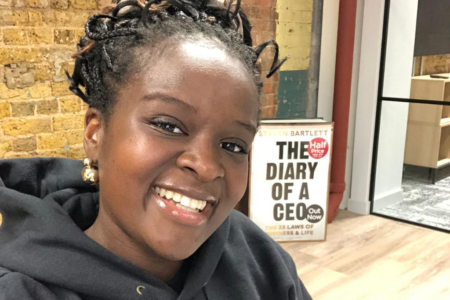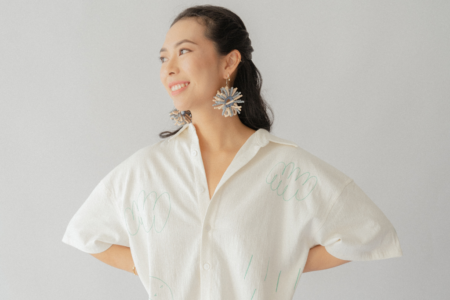
Out of thousands of applicants worldwide, only 10 were selected for Season Two of what’s been called the toughest edition of “The Apprentice”: The Apprentice: ONE Championship Edition.
One of them was Thailand’s Vanessa Techapichetvanich, who competed with the other nine contestants for the grand prize — a US$250,000 job offer at ONE’s headquarters in Singapore and a chance to be CEO and Chairman Chatri Sityodtong’s protege.
Despite a slow start, Techapichetvanich prevailed. She applied the feedback she received throughout the show and roared on to win the competition. In doing so, she became the Director of Strategic Projects at ONE.
In this role, she managed brand partnerships, worked on deals worth over US$15 million in the Thai market, helped increase Thai athletes’ social media followers by 30%, and oversaw events and talent management.

After winning The Apprentice: ONE Championship Edition, Techapichetvanich (fourth from left) joined ONE as the Director of Strategic Projects. Source: Vanessa Techapichetvanich
Vanessa Techapichetvanich’s early life
Born in Thailand, Techapichetvanich has a unique mix of cultures. Her maternal grandfather is Japanese. Growing up, she lived in several countries, including Thailand, Indonesia, Singapore, China, and Japan, which gave her a diverse view of the world.
This global exposure influenced her academic choices as well. At Harrow International School Bangkok, Techapichetvanich was always up for a challenge. She decided to take five A Level subjects — Physics, Chemistry, Math, Further Math, and Chinese — while most students typically take three or four.
“I just want to be that student who can prove to the world that I can do it,” she says.
That same determination led her to make an unconventional choice after graduating from Harrow — taking a gap year. It wasn’t a decision she made lightly, but it felt like the right path after facing some disappointments.
Techapichetvanich had initially dreamed of studying biomedical engineering at the Massachusetts Institute of Technology (MIT), which had an acceptance rate of 5%.
“I was on the waiting list for about two months before they informed me of the final decision, and I didn’t make it,” she says.
While Techapichetvanich was offered a scholarship to study biomedical engineering at Hong Kong University, something didn’t feel right. “I didn’t like bio,” she says. “I want to do something more focused on physics-based subjects, whether it’s aerospace engineering or mechanical engineering.”
Rather than dwelling on the disappointment, Techapichetvanich used the setback to explore other options. “I didn’t want to go to Singapore or Hong Kong,” she says. “I wanted to go somewhere different from where I was.”
That’s where her gap year turned out to be a rewarding experience. It allowed her to learn, explore, and have fun, all while gaining clarity about her future. During this period, she applied to Waseda University, a research-intensive institution in Tokyo, which perfectly fits her goals and personality.
While Nagoya University offered more generous scholarships, Techapichetvanich knew she thrived in a bustling, vibrant city. “I was always a city girl,” she says. “Tokyo was the ideal choice.”

Techapichetvanich’s aims to empower future leaders and create opportunities for global impact. Source: Vanessa Techapichetvanich
Leaving engineering behind for a career in digital marketing
Techapichetvanich’s experience in engineering wasn’t exactly what she expected. In her second year, she found herself the only girl in the class, and worse, she didn’t feel like she fit in with her peers.
While she used to love physics, studying engineering made her realise she needed something more creative and human-driven. “I needed something that would allow me to meet people and do business deals,” Techapichetvanich says.
Choosing engineering seemed strategic at first — a way to develop logical and critical thinking skills that she could later apply to business. “I thought it would be easier than if I studied business and then tried to get into coding or software engineering,” she says.
But the reality was tough. By her second year, Techapichetvanich struggled with challenging courses like programming, robotics, and differential equations. Despite the difficulties, she pushed through, determined not to quit.
And it paid off — she graduated with a strong GPA.
However, in 2018, her interests shifted to digital marketing, leading her back to Bangkok, where Southeast Asia’s vibrant startup ecosystem beckoned. “I made that choice because the startup ecosystem is much more active in places like Malaysia, the Philippines, and Indonesia,” she says.

Techapichetvanich has led digital content marketing and business growth across travel, consumer goods, B2B, sports media, and innovation. Source: Vanessa Techapichetvanich
In Bangkok, she co-founded JAMULOGY, a food-tech startup and the world’s first fusion jamu maker that produces high-quality Indonesian herbal drinks.
However, running a business proved far from simple. One of her biggest lessons came from over-investing in a production facility instead of partnering with existing manufacturing facilities in Thailand.
“Thailand is number one in food manufacturing, and I’d say it’s also the food hub of Southeast Asia,” she says.
“Instead of outsourcing, we feared our R&D, know-how, and IP would be misused. But I later learned that it’s not about who can copy whom in the food industry. If customers like your food, they’ll stay loyal to your product. That’s what keeps your business going.”
Despite the hurdles, Techapichetvanich scaled JAMULOGY across five countries, generating US$72,000 in revenue within six months of launching the MVP. She brought product concepts to life, built a manufacturing line, implemented pricing strategies, and ensured compliance with global standards like GMP, HACCP, Halal, and USFDA.
Beyond production, she spearheaded a 360-degree sales and marketing strategy. This included forging strategic partnerships, launching public relations campaigns, and overseeing the development of the company’s website to enhance visibility and engagement.
These skills proved crucial when she competed in the second season of “The Apprentice: ONE Championship Edition. “

After watching Season 1 of The Apprentice ONE Championship, Techapichetvanich decided to join Season 2, where she competed alongside eight other remarkable contestants. Source: Vanessa Techapichetvanich
Winning ‘The Apprentice: ONE Championship Edition’
Techapichetvanich first discovered “The Apprentice: ONE Championship Edition” during the quiet days of COVID. With little else to watch, she gave season one a try on Netflix. “I immediately thought, ‘Wow, this competition is made for me,’” she says.
A lover of fitness, obstacle races, and business challenges, she knew it was something she wanted to be a part of.
The spark to apply came when she stumbled upon a post by angel investor Jason Ma, who shared a photo with Sityodtong, the show’s creator.
“The first post I saw on Sityodtong’s Instagram was about a casting call for season two,” she says. “It felt like a jackpot. But he had posted it a month or two ago, so I was worried I might miss the deadline. I went to the link in his bio and saw that applications were still open. So I decided to apply.”
At the time, Techapichetvanich was at a crossroads. She was considering leaving her startup, JAMULOGY, and deciding whether to stay in Thailand or move to Indonesia to explore new opportunities. One option was joining Antler, a startup incubator programme, to find co-founders for a new business.
But the chance to compete on The Apprentice was too good to pass up. She applied for both and let fate decide.
One Championship got back to Techapichetvanich with a casting call, and she went through three rounds of interviews with the executive producer from the production house they work with.
“It took several months, but I really wanted to make it,” she says. Finally, in December 2022, five months after applying, she got the news: she’d made it onto the show.

Techapichetvanich admits she learned a lot from Chatri Sityodtong, the CEO of ONE Championship, during the competition. Source: Vanessa Techapichetvanich
The competition was intense, testing both intellectual and leadership skills, as well as physical endurance. Every episode kicked off with a demanding physical challenge, from desert endurance tests in Qatar to deep-sea diving and horseback riding.
These were followed by business tasks, including creating a sales pitch for luxury yachts or developing a sustainable hawker dining product.
The most gruelling part, however, was the lack of sleep. Filming was fast-paced, with episodes shot back-to-back. “People think one episode takes a week, but we filmed it in two days,” Techapichetvanich says.
After an elimination in the evening, contestants would return the next day at 4:00 AM for another round of filming. “The lack of time was the real challenge,” she says. “We only had 15 to 24 hours to work on each business challenge.”
Despite the exhaustion, Techapichetvanich stayed focused throughout the competition. “It was crazy, but it was also an incredible opportunity to grow,” she says.
She didn’t just grow but also won the competition, securing a one-year contract to become the Director of Strategic Projects at ONE.
“For the first half of my year, I worked directly with the chief operating officer,” she says. “It was operations-heavy, working with the production house operations — basically, the team that builds a product, expands it, and tries to create the best product possible.”
In the second half, Techapichetvanich worked directly with the Thailand team, especially on the commercial side. This part of her role was particularly eye-opening because it was sales-oriented.
Techapichetvanich was now managing and leading sales operations, focusing on pushing the sales and commercial teams to secure more deals and partnerships with brands. “I reported to Chatri weekly and drove the team to achieve new sales goals,” she says.

As the Chief Partnership Officer of Study in Asia, Techapichetvanich and her team are working to position Asia as the global education hub by 2030. Source: Vanessa Techapichetvanich
Exploring new opportunities
Techapichetvanich left ONE Championship in June 2024 to pursue new opportunities and hit the reset button on her career and life.
After leaving Singapore, she returned to Bangkok for a break to reflect on her next steps. During this time, she decided to head to Jakarta, where she spent more time with her family.
With some free time, Techapichetvanich also explored her passion for fitness by becoming a rhythm cycling instructor. Although it wasn’t a major career move, she saw it as a way to stay active and challenge herself while working on investment projects. It was a good balance of work and personal fulfilment.
As she settled into life in Jakarta, an unexpected opportunity came her way. “An entrepreneur in the ed-tech industry reached out to me to see if I’d be interested in joining his startup, Stealth,” she says. “He shared his vision, his long-term and mid-term plans, and the team he was building.”
After reviewing the pitch, Techapichetvanich decided to give it a shot. The project felt right — a great team, a solid vision, and a good vibe. “I still want to create an impact, and this will probably be one of the most active entrepreneurial gigs I’ll do,” she says.
Along with her co-founders Kevin Cho and Rodel Sta Ana, she launched Study in Asia — an AI-powered platform that helps international students explore study options across Asia. It’s a fresh alternative for those looking for quality education beyond the usual places like Canada, the US, or the UK.
Their goal is ambitious: to make Asia the next global education hub by 2030. “For overseas education, we aim to shift that trend and bring it to Asia,” Techapichetvanich says. “That’s the core of what we’re building, and this is just the beginning of a long-term journey.”









